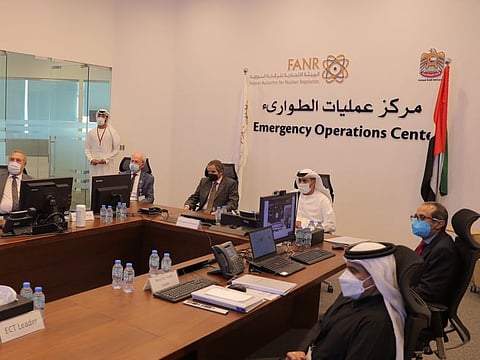IAEA director-general tours Barakah Nuclear Power Plant
Rafael Grossi is also visiting other nuclear energy-related sites during his UAE visit

Abu Dhabi: Rafael Grossi, the Director-General of International Atomic Energy Agency (IAEA), is currently on a tour of the UAE to check out the Barakah Nuclear Power Plant and other sites.
In 2020, UAE became the first Arab country to operate a nuclear power plant under the wise and visionary directives of the UAE leadership. It currently has four units at Barakah Nuclear Power Plant, where the first unit is commercially operative and delivering electricity to the national grid. The second unit is undergoing a testing phase, while the construction of the third unit is complete and the fourth unit is 91 per cent complete.
Since 1976, the UAE has had a robust collaboration with the IAEA in nuclear and non-nuclear power aspects. In 2008, the UAE-IAEA relationship was further strengthened when the UAE launched its Policy on the Evaluation and Potential Development of Peaceful Nuclear Energy. The policy is built on the most rigorous international standards of safety, transparency and security, making the UAE a role model for nuclear energy development worldwide.
Peaceful nuclear power programme
“It was very impressive to visit Barakah and see first-hand all that the UAE has achieved over the past decade in becoming the first Arab country to build and operate a nuclear power plant. The UAE’s 100 per cent commitment to introduce a peaceful nuclear power programme in a safe and secure way can serve as a model for other countries, considering that this clean energy source helps ensure sustainable prosperity for the people. As with other member-states introducing or expanding their existing nuclear energy programmes, the IAEA has worked closely with the UAE from the beginning to help it turn this objective into reality,” Grossi said.
The IAEA has been supporting the UAE in developing the nuclear power programme to meet the increasing energy demand. The agency has provided guidance on the development of the national nuclear infrastructure where the UAE received 12 IAEA-led missions covering nuclear safety, nuclear security, radiation protection, emergency preparedness, capacity building, as well as legal and regulatory systems, and nuclear non-proliferation.
Strong collaboration
“The visit of the IAEA director-general to the UAE to tour the Barakah Nuclear Power Plant and other key institutions is an important endorsement of the UAE as a role model country for nuclear newcomers in building and operating a nuclear power plant. The strong collaboration that binds the UAE and IAEA is a cornerstone for ensuring the delivery of the UAE’s energy needs and maintaining highest standards of safety, security and non-proliferation,” said Hamad Al Kaabi, Ambassador and Resident Representative of the Permanent Mission of the United Arab Emirates to the IAEA.
Accompanied by Hamad Al Kaabi, Grossi visited the headquarters of the Federal Authority for Nuclear Regulation (FANR), where he toured the Emergency Operations Centre (EOC) and was briefed about the UAE’s emergency preparedness and response system to address nuclear or radiological emergencies.
During his visit, he met FANR’s young Emirati engineers where he shared his career insights and discussed future opportunities of regulating the nuclear sector. In addition, he was introduced to the latest innovative regulatory inspection practices at FANR.
Gender balance at heart
Since its inception in 2008, the UAE government has been investing in building human capacity, especially among Emiratis to ensure the sustainability of the nuclear energy programme to serve the nation’s needs. The FANR employs more than 245 employees, with emiratisation rate at 72 per cent. FANR has been supporting the UAE government’s goals to be among the top 25 countries achieving gender balance by 2021. It achieved significant strides in empowering women by adopting its Gender Balance Strategy and currently women represent 42 per cent of its workforce. They also hold half of all leadership positions. In addition, it has 39 female engineers and young people, who represents 44 per cent of its total workforce.
Following the UAE’s National Agenda goals, FANR‘s Research and Development wing contributed significantly in building and maintaining high levels of nuclear and radiation safety knowledge. FANR’s research and development policy helped attract and support Emiratis in scientific research, leading to publishing 79 papers by its employees in conferences as well as sponsoring 24 employees in specialised nuclear-related research.
Principle of transparency
The UAE Nuclear Energy Programme, including the nuclear law and regulations, conforms to the highest safety standards of the IAEA and international best practices. The UAE government has been committed to the principle of transparency, enshrined in the UAE nuclear policy, by adhering to international conventions and agreements such the IAEA’s Safeguard Agreement and its Additional Protocol and the Convention on Nuclear Safety and other instruments. Such commitments ensure the programme is designed for peaceful purposes and in line with national and international laws.
It is noteworthy that the UAE and IAEA have signed this month the UAE’s Country Programme Framework (CPF) for the period of 2021-2027. A CPF is the frame of reference for the medium-term planning of technical cooperation between a member-state and the IAEA and identifies priority areas where the transfer of nuclear technology and technical cooperation resources will be directed to support national development goals. The 2021-2027 CPF identifies four priority areas: Nuclear energy and infrastructure; nuclear and radiation safety and security; human health; and finally food and agriculture.


